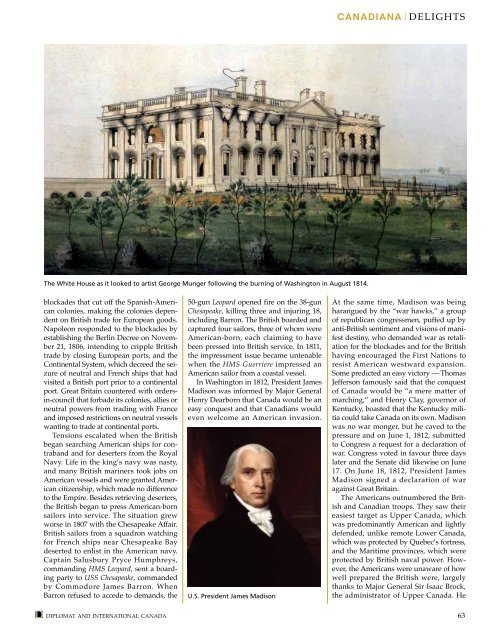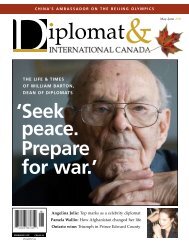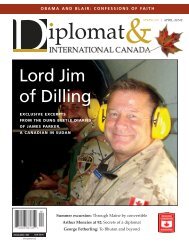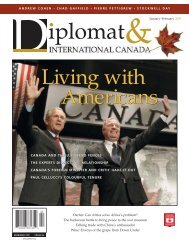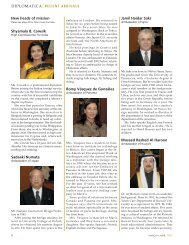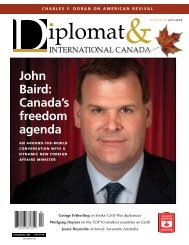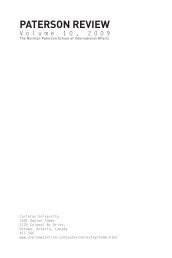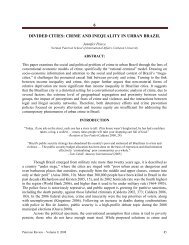the new petro power paradigm - Diplomat Magazine
the new petro power paradigm - Diplomat Magazine
the new petro power paradigm - Diplomat Magazine
Create successful ePaper yourself
Turn your PDF publications into a flip-book with our unique Google optimized e-Paper software.
canadiana|DELIGHTS<br />
The White House as it looked to artist George Munger following <strong>the</strong> burning of Washington in August 1814.<br />
blockades that cut off <strong>the</strong> Spanish-American<br />
colonies, making <strong>the</strong> colonies dependent<br />
on British trade for European goods.<br />
Napoleon responded to <strong>the</strong> blockades by<br />
establishing <strong>the</strong> Berlin Decree on November<br />
21, 1806, intending to cripple British<br />
trade by closing European ports, and <strong>the</strong><br />
Continental System, which decreed <strong>the</strong> seizure<br />
of neutral and French ships that had<br />
visited a British port prior to a continental<br />
port. Great Britain countered with ordersin-council<br />
that forbade its colonies, allies or<br />
neutral <strong>power</strong>s from trading with France<br />
and imposed restrictions on neutral vessels<br />
wanting to trade at continental ports.<br />
Tensions escalated when <strong>the</strong> British<br />
began searching American ships for contraband<br />
and for deserters from <strong>the</strong> Royal<br />
Navy. Life in <strong>the</strong> king’s navy was nasty,<br />
and many British mariners took jobs on<br />
American vessels and were granted American<br />
citizenship, which made no difference<br />
to <strong>the</strong> Empire. Besides retrieving deserters,<br />
<strong>the</strong> British began to press American-born<br />
sailors into service. The situation grew<br />
worse in 1807 with <strong>the</strong> Chesapeake Affair.<br />
British sailors from a squadron watching<br />
for French ships near Chesapeake Bay<br />
deserted to enlist in <strong>the</strong> American navy.<br />
Captain Salusbury Pryce Humphreys,<br />
commanding HMS Leopard, sent a boarding<br />
party to USS Chesapeake, commanded<br />
by Commodore James Barron. When<br />
Barron refused to accede to demands, <strong>the</strong><br />
50-gun Leopard opened fire on <strong>the</strong> 38-gun<br />
Chesapeake, killing three and injuring 18,<br />
including Barron. The British boarded and<br />
captured four sailors, three of whom were<br />
American-born, each claiming to have<br />
been pressed into British service. In 1811,<br />
<strong>the</strong> impressment issue became untenable<br />
when <strong>the</strong> HMS Guerriere impressed an<br />
American sailor from a coastal vessel.<br />
In Washington in 1812, President James<br />
Madison was informed by Major General<br />
Henry Dearborn that Canada would be an<br />
easy conquest and that Canadians would<br />
even welcome an American invasion.<br />
U.S. President James Madison<br />
At <strong>the</strong> same time, Madison was being<br />
harangued by <strong>the</strong> “war hawks,” a group<br />
of republican congressmen, puffed up by<br />
anti-British sentiment and visions of manifest<br />
destiny, who demanded war as retaliation<br />
for <strong>the</strong> blockades and for <strong>the</strong> British<br />
having encouraged <strong>the</strong> First Nations to<br />
resist American westward expansion.<br />
Some predicted an easy victory — Thomas<br />
Jefferson famously said that <strong>the</strong> conquest<br />
of Canada would be “a mere matter of<br />
marching,” and Henry Clay, governor of<br />
Kentucky, boasted that <strong>the</strong> Kentucky militia<br />
could take Canada on its own. Madison<br />
was no war monger, but he caved to <strong>the</strong><br />
pressure and on June 1, 1812, submitted<br />
to Congress a request for a declaration of<br />
war. Congress voted in favour three days<br />
later and <strong>the</strong> Senate did likewise on June<br />
17. On June 18, 1812, President James<br />
Madison signed a declaration of war<br />
against Great Britain.<br />
The Americans outnumbered <strong>the</strong> British<br />
and Canadian troops. They saw <strong>the</strong>ir<br />
easiest target as Upper Canada, which<br />
was predominantly American and lightly<br />
defended, unlike remote Lower Canada,<br />
which was protected by Quebec’s fortress,<br />
and <strong>the</strong> Maritime provinces, which were<br />
protected by British naval <strong>power</strong>. However,<br />
<strong>the</strong> Americans were unaware of how<br />
well prepared <strong>the</strong> British were, largely<br />
thanks to Major General Sir Isaac Brock,<br />
<strong>the</strong> administrator of Upper Canada. He<br />
diplomat and international canada 63


